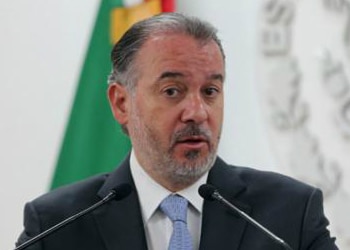Mexico’s top prosecutor has stepped down less than a year after taking office amid growing pressure to tackle widespread corruption. The resignation serves as another example of civil society’s influence in fighting graft in the region, but it also raises questions about whether his successor can make a difference.
On October 16, Mexico Attorney General Raúl Cervantes Andrade, a close ally of President Enrique Peña Nieto, announced his resignation, according to a press release from the Attorney General’s Office (Procuraduría General de la República – PGR).
Cervantes’ resignation comes amid a nationwide debate regarding a law that Mexican Congress approved in 2014 to replace the country’s Attorney General’s Office with an entirely autonomous office, which would have subsequently given Cervantes an “automatic pass” to be the country’s first autonomous attorney general with a nine-year term.
SEE ALSO: Coverage of Judicial Reform
It also comes after Cervantes himself was at the center of a corruption debate earlier this year.
In September, a report from the watchdog group Mexicans Against Corruption and Impunity (Mexicanos Contra la Corrupción y la Impunidad – MCCI) called into question his ownership of a $218,000 Ferrari located at an allegedly unoccupied house in Morelos state. Cervantes called the car’s registration there an “administrative error.”
Security policy consultant and former police official Jaime López told InSight Crime that Cervantes’ resignation “makes sense,” adding that, while the Ferrari incident was not illegal, Cervantes’ presence in the Attorney General’s Office “was kind of distracting.”
In a statement, Cervantes said that it was the “correct” decision to create an autonomous prosecutor’s office so that prosecutors could decide with “complete autonomy” whether or not to pursue cases, adding that his resignation was about “building better institutions.”
A new attorney general will not be announced until after the July 2018 general elections, according to Animal Político. Deputy Attorney General Albert Elías Beltrán has been named the interim attorney general.
InSight Crime Analysis
Raúl Cervantes was widely seen as a broader symbol of the Mexican government’s apparent inability to tackle widespread graft and ensure accountability and transparency in government institutions. And due to his personal ties to Peña Nieto and the governing Institutional Revolutionary Party (Partido Revolucionario Institucional – PRI), some believe that Cervantes’ departure — spurred in part by pressure from civil society — signals a positive step for Mexico’s fight against corruption.
Indeed, Cervantes has not had much success over the past year. The emblematic case of 43 students disappeared in 2014 has remained unsolved, Mexico is on pace for its most violent year in decades, impunity continues to reign, and a number of ex-governors — many of them from the president’s party — have been accused of corruption.
SEE ALSO: Mexico News and Profiles
However, while Cervantes’ resignation does open up the door for a non-partisan selection for Mexico’s next attorney general, there are doubts that this alone can help resolve the country’s institutional corruption problems. To be sure, Mexican journalist Jorge Ramos proposed the idea of a United Nations-backed anti-corruption commission for Mexico modeled on the International Commission against Impunity in Guatemala (Comisión Internacional Contra la Impunidad en Guatemala – CICIG) to help solve the problem.
But López, the security consultant, told InSight Crime that such a scenario would be unlikely, explaining that only a “total collapse of confidence” in Mexico’s institutions would create the conditions for an international anti-corruption commission to be introduced.
Still, civil society has proven its resolve elsewhere in the region. For example, Guatemala’s Congress backtracked on an “impunity pact” after protesters took to the streets to strike against corruption and impunity in the wake of an evolving political crisis involving President Jimmy Morales. But whether such actors will have the same success in Mexico, where institutional corruption exists under different conditions, remains to be seen.

